Analyzing the Economic, Social, and Environmental Impacts of Tourism
VerifiedAdded on 2023/06/17
|7
|2100
|254
Report
AI Summary
This report provides a detailed analysis of the multifaceted impacts of tourism, focusing on economic, socio-cultural, and environmental aspects. It begins by defining contemporary tourism and its rapid growth, highlighting developments such as investment in cruise tourism, improvements in accommodation services, and route development. The report then delves into the economic impacts, discussing both positive effects like increased employment and GDP contributions, and negative effects such as seasonal job creation and infrastructure costs. The environmental impact section examines how tourism contributes to government revenues for conservation efforts but also leads to pollution and depletion of natural resources. Finally, the socio-cultural impacts are explored, noting improvements in lifestyle and cultural understanding alongside negative consequences like overcrowding and increased crime rates. The report concludes that while tourism significantly contributes to a country's GDP, it also presents challenges that need to be addressed for sustainable development and can be further explored with similar resources available on Desklib.
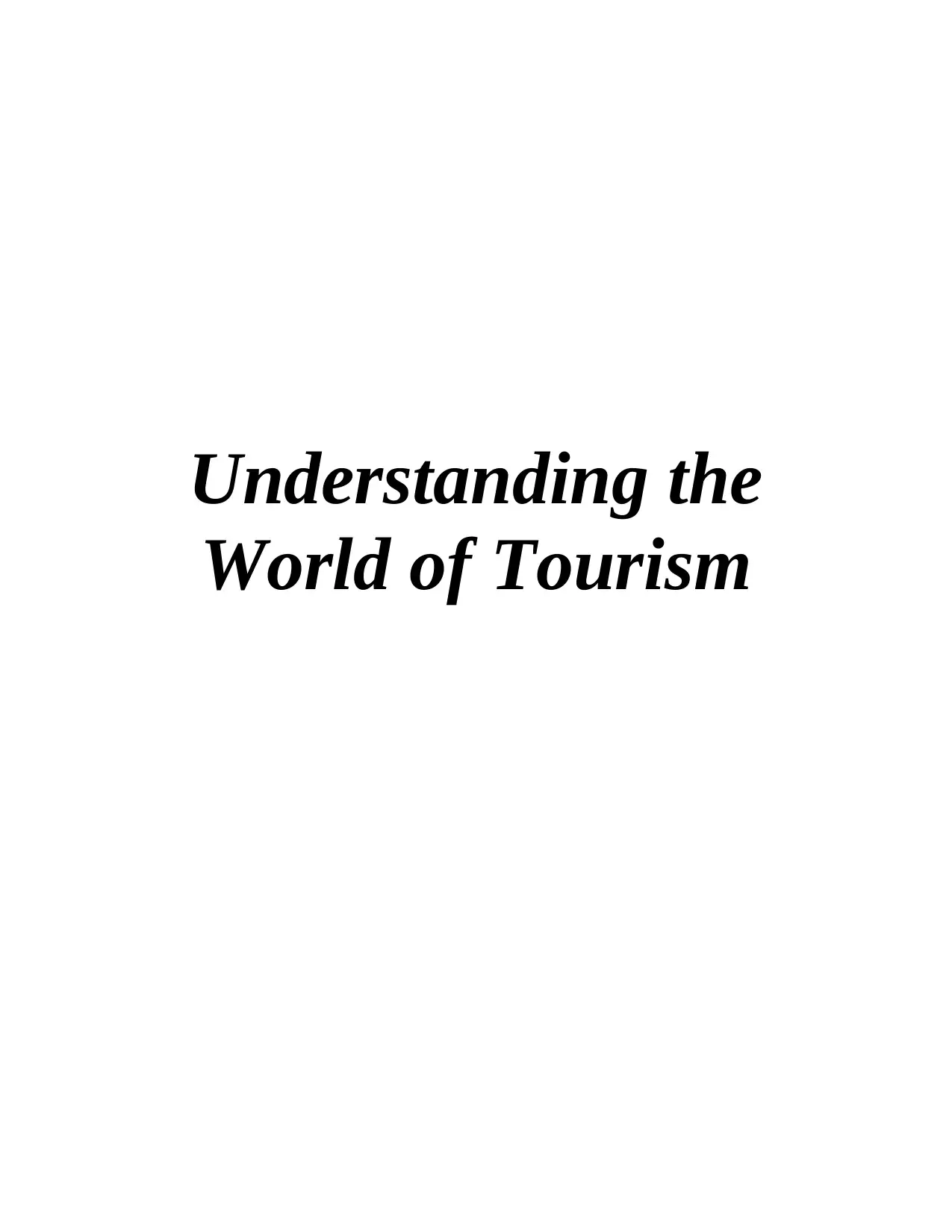
Understanding the
World of Tourism
World of Tourism
Paraphrase This Document
Need a fresh take? Get an instant paraphrase of this document with our AI Paraphraser
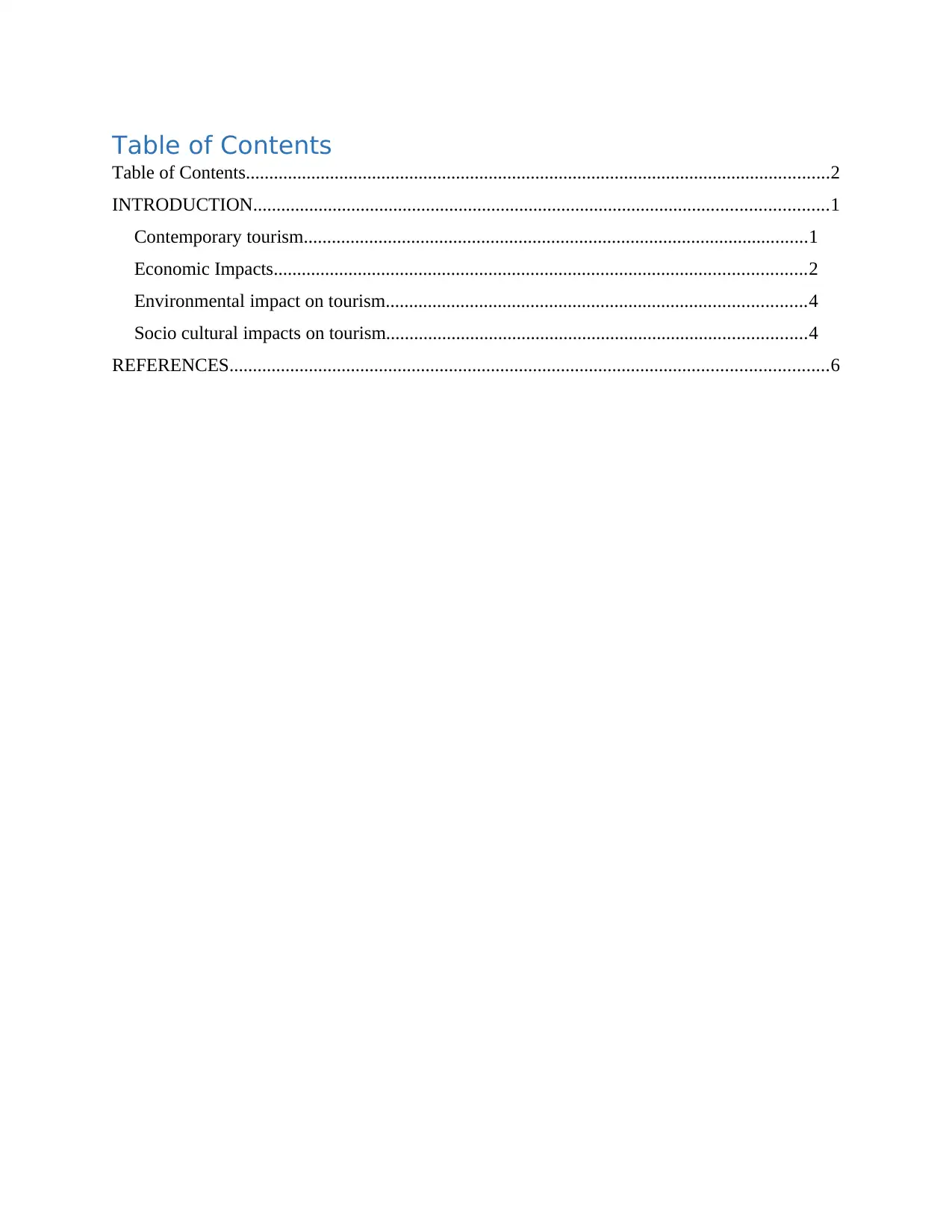
Table of Contents
Table of Contents.............................................................................................................................2
INTRODUCTION...........................................................................................................................1
Contemporary tourism............................................................................................................1
Economic Impacts..................................................................................................................2
Environmental impact on tourism..........................................................................................4
Socio cultural impacts on tourism..........................................................................................4
REFERENCES................................................................................................................................6
Table of Contents.............................................................................................................................2
INTRODUCTION...........................................................................................................................1
Contemporary tourism............................................................................................................1
Economic Impacts..................................................................................................................2
Environmental impact on tourism..........................................................................................4
Socio cultural impacts on tourism..........................................................................................4
REFERENCES................................................................................................................................6
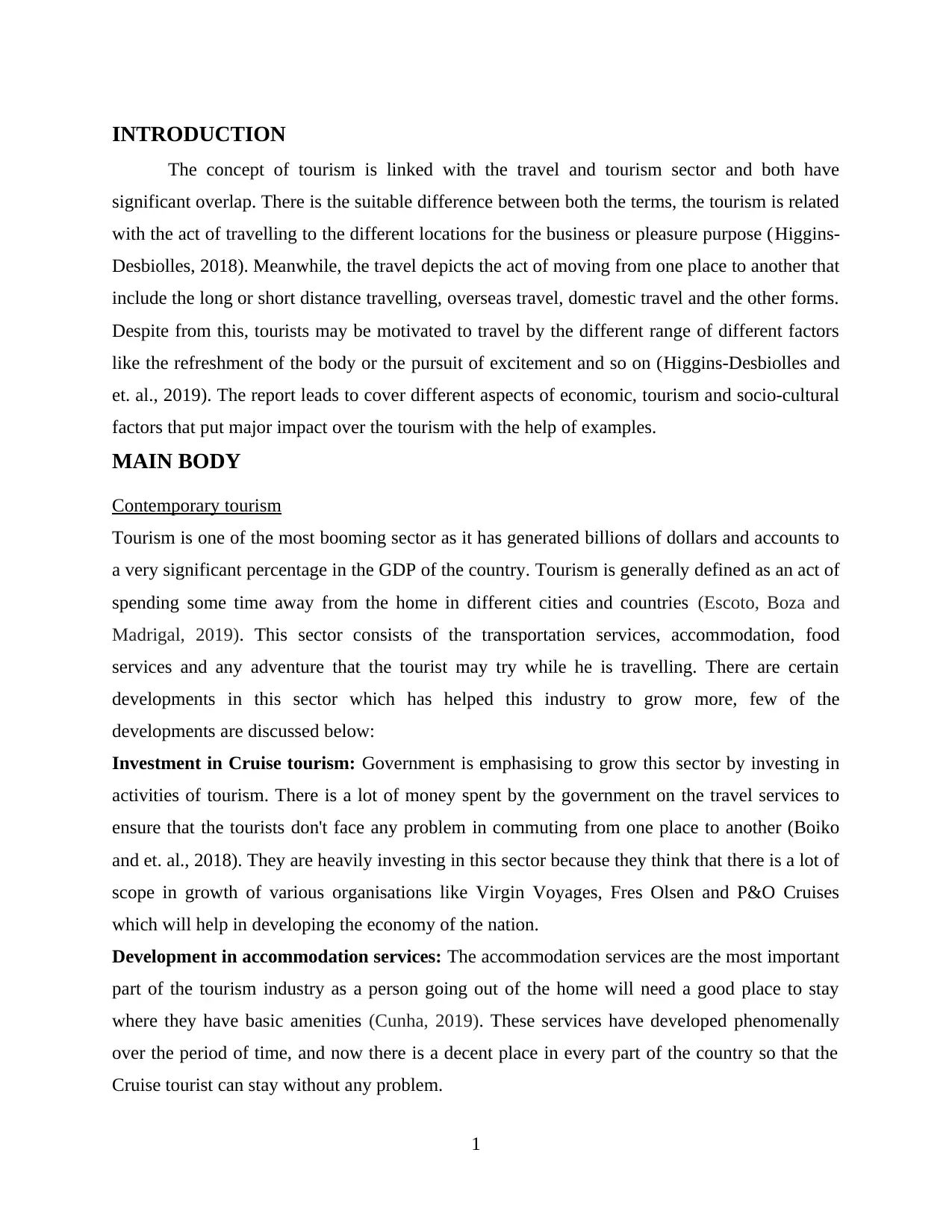
INTRODUCTION
The concept of tourism is linked with the travel and tourism sector and both have
significant overlap. There is the suitable difference between both the terms, the tourism is related
with the act of travelling to the different locations for the business or pleasure purpose (Higgins-
Desbiolles, 2018). Meanwhile, the travel depicts the act of moving from one place to another that
include the long or short distance travelling, overseas travel, domestic travel and the other forms.
Despite from this, tourists may be motivated to travel by the different range of different factors
like the refreshment of the body or the pursuit of excitement and so on (Higgins-Desbiolles and
et. al., 2019). The report leads to cover different aspects of economic, tourism and socio-cultural
factors that put major impact over the tourism with the help of examples.
MAIN BODY
Contemporary tourism
Tourism is one of the most booming sector as it has generated billions of dollars and accounts to
a very significant percentage in the GDP of the country. Tourism is generally defined as an act of
spending some time away from the home in different cities and countries (Escoto, Boza and
Madrigal, 2019). This sector consists of the transportation services, accommodation, food
services and any adventure that the tourist may try while he is travelling. There are certain
developments in this sector which has helped this industry to grow more, few of the
developments are discussed below:
Investment in Cruise tourism: Government is emphasising to grow this sector by investing in
activities of tourism. There is a lot of money spent by the government on the travel services to
ensure that the tourists don't face any problem in commuting from one place to another (Boiko
and et. al., 2018). They are heavily investing in this sector because they think that there is a lot of
scope in growth of various organisations like Virgin Voyages, Fres Olsen and P&O Cruises
which will help in developing the economy of the nation.
Development in accommodation services: The accommodation services are the most important
part of the tourism industry as a person going out of the home will need a good place to stay
where they have basic amenities (Cunha, 2019). These services have developed phenomenally
over the period of time, and now there is a decent place in every part of the country so that the
Cruise tourist can stay without any problem.
1
The concept of tourism is linked with the travel and tourism sector and both have
significant overlap. There is the suitable difference between both the terms, the tourism is related
with the act of travelling to the different locations for the business or pleasure purpose (Higgins-
Desbiolles, 2018). Meanwhile, the travel depicts the act of moving from one place to another that
include the long or short distance travelling, overseas travel, domestic travel and the other forms.
Despite from this, tourists may be motivated to travel by the different range of different factors
like the refreshment of the body or the pursuit of excitement and so on (Higgins-Desbiolles and
et. al., 2019). The report leads to cover different aspects of economic, tourism and socio-cultural
factors that put major impact over the tourism with the help of examples.
MAIN BODY
Contemporary tourism
Tourism is one of the most booming sector as it has generated billions of dollars and accounts to
a very significant percentage in the GDP of the country. Tourism is generally defined as an act of
spending some time away from the home in different cities and countries (Escoto, Boza and
Madrigal, 2019). This sector consists of the transportation services, accommodation, food
services and any adventure that the tourist may try while he is travelling. There are certain
developments in this sector which has helped this industry to grow more, few of the
developments are discussed below:
Investment in Cruise tourism: Government is emphasising to grow this sector by investing in
activities of tourism. There is a lot of money spent by the government on the travel services to
ensure that the tourists don't face any problem in commuting from one place to another (Boiko
and et. al., 2018). They are heavily investing in this sector because they think that there is a lot of
scope in growth of various organisations like Virgin Voyages, Fres Olsen and P&O Cruises
which will help in developing the economy of the nation.
Development in accommodation services: The accommodation services are the most important
part of the tourism industry as a person going out of the home will need a good place to stay
where they have basic amenities (Cunha, 2019). These services have developed phenomenally
over the period of time, and now there is a decent place in every part of the country so that the
Cruise tourist can stay without any problem.
1
⊘ This is a preview!⊘
Do you want full access?
Subscribe today to unlock all pages.

Trusted by 1+ million students worldwide
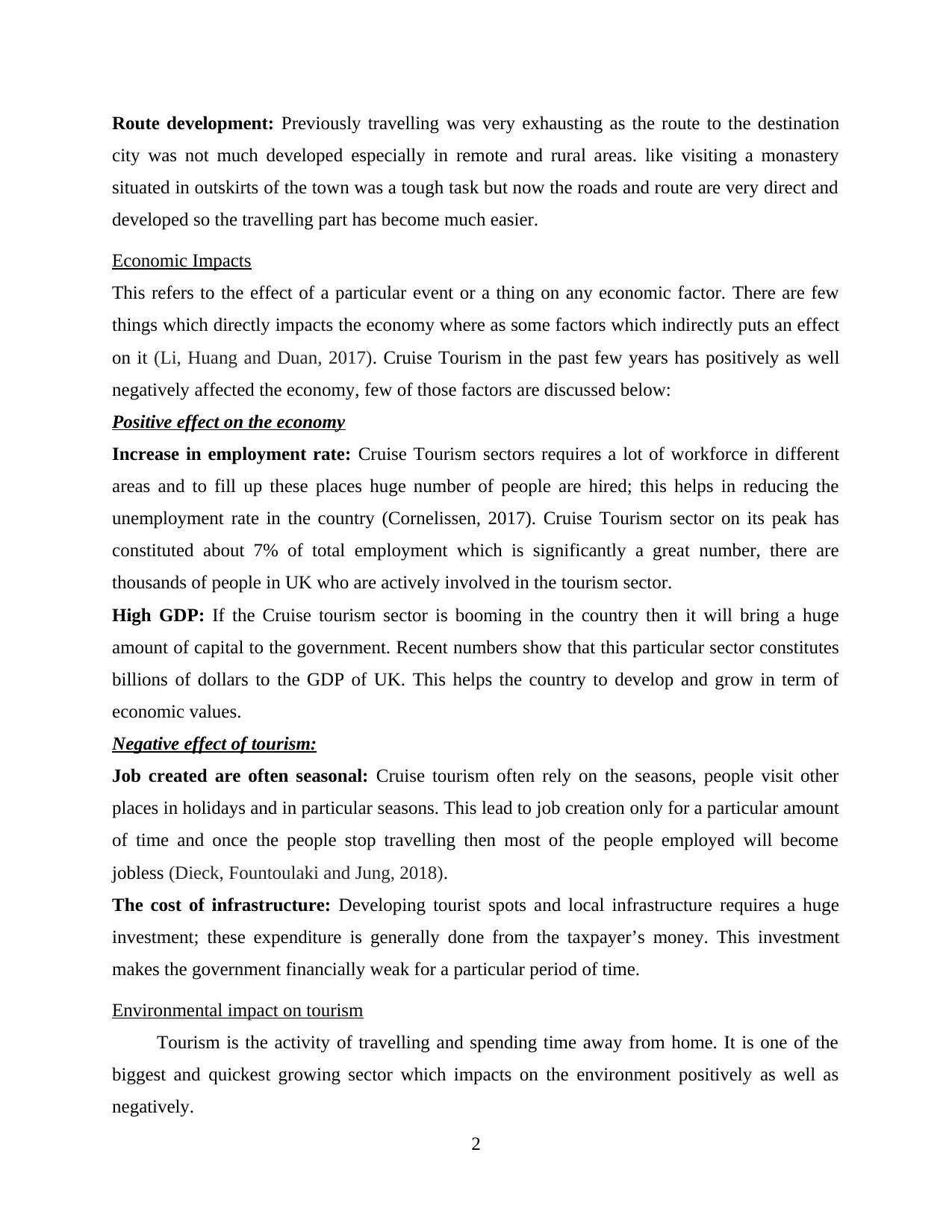
Route development: Previously travelling was very exhausting as the route to the destination
city was not much developed especially in remote and rural areas. like visiting a monastery
situated in outskirts of the town was a tough task but now the roads and route are very direct and
developed so the travelling part has become much easier.
Economic Impacts
This refers to the effect of a particular event or a thing on any economic factor. There are few
things which directly impacts the economy where as some factors which indirectly puts an effect
on it (Li, Huang and Duan, 2017). Cruise Tourism in the past few years has positively as well
negatively affected the economy, few of those factors are discussed below:
Positive effect on the economy
Increase in employment rate: Cruise Tourism sectors requires a lot of workforce in different
areas and to fill up these places huge number of people are hired; this helps in reducing the
unemployment rate in the country (Cornelissen, 2017). Cruise Tourism sector on its peak has
constituted about 7% of total employment which is significantly a great number, there are
thousands of people in UK who are actively involved in the tourism sector.
High GDP: If the Cruise tourism sector is booming in the country then it will bring a huge
amount of capital to the government. Recent numbers show that this particular sector constitutes
billions of dollars to the GDP of UK. This helps the country to develop and grow in term of
economic values.
Negative effect of tourism:
Job created are often seasonal: Cruise tourism often rely on the seasons, people visit other
places in holidays and in particular seasons. This lead to job creation only for a particular amount
of time and once the people stop travelling then most of the people employed will become
jobless (Dieck, Fountoulaki and Jung, 2018).
The cost of infrastructure: Developing tourist spots and local infrastructure requires a huge
investment; these expenditure is generally done from the taxpayer’s money. This investment
makes the government financially weak for a particular period of time.
Environmental impact on tourism
Tourism is the activity of travelling and spending time away from home. It is one of the
biggest and quickest growing sector which impacts on the environment positively as well as
negatively.
2
city was not much developed especially in remote and rural areas. like visiting a monastery
situated in outskirts of the town was a tough task but now the roads and route are very direct and
developed so the travelling part has become much easier.
Economic Impacts
This refers to the effect of a particular event or a thing on any economic factor. There are few
things which directly impacts the economy where as some factors which indirectly puts an effect
on it (Li, Huang and Duan, 2017). Cruise Tourism in the past few years has positively as well
negatively affected the economy, few of those factors are discussed below:
Positive effect on the economy
Increase in employment rate: Cruise Tourism sectors requires a lot of workforce in different
areas and to fill up these places huge number of people are hired; this helps in reducing the
unemployment rate in the country (Cornelissen, 2017). Cruise Tourism sector on its peak has
constituted about 7% of total employment which is significantly a great number, there are
thousands of people in UK who are actively involved in the tourism sector.
High GDP: If the Cruise tourism sector is booming in the country then it will bring a huge
amount of capital to the government. Recent numbers show that this particular sector constitutes
billions of dollars to the GDP of UK. This helps the country to develop and grow in term of
economic values.
Negative effect of tourism:
Job created are often seasonal: Cruise tourism often rely on the seasons, people visit other
places in holidays and in particular seasons. This lead to job creation only for a particular amount
of time and once the people stop travelling then most of the people employed will become
jobless (Dieck, Fountoulaki and Jung, 2018).
The cost of infrastructure: Developing tourist spots and local infrastructure requires a huge
investment; these expenditure is generally done from the taxpayer’s money. This investment
makes the government financially weak for a particular period of time.
Environmental impact on tourism
Tourism is the activity of travelling and spending time away from home. It is one of the
biggest and quickest growing sector which impacts on the environment positively as well as
negatively.
2
Paraphrase This Document
Need a fresh take? Get an instant paraphrase of this document with our AI Paraphraser
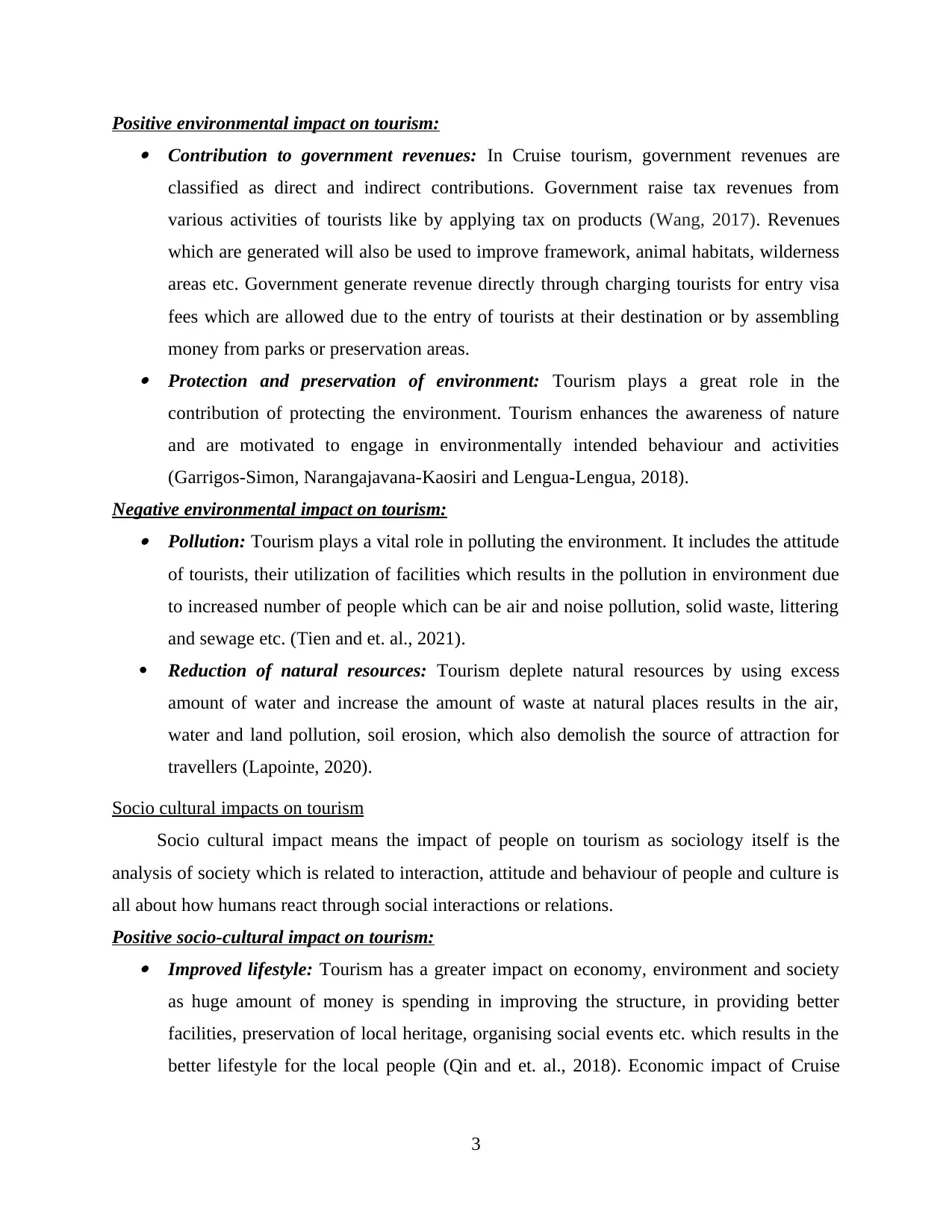
Positive environmental impact on tourism: Contribution to government revenues: In Cruise tourism, government revenues are
classified as direct and indirect contributions. Government raise tax revenues from
various activities of tourists like by applying tax on products (Wang, 2017). Revenues
which are generated will also be used to improve framework, animal habitats, wilderness
areas etc. Government generate revenue directly through charging tourists for entry visa
fees which are allowed due to the entry of tourists at their destination or by assembling
money from parks or preservation areas. Protection and preservation of environment: Tourism plays a great role in the
contribution of protecting the environment. Tourism enhances the awareness of nature
and are motivated to engage in environmentally intended behaviour and activities
(Garrigos-Simon, Narangajavana-Kaosiri and Lengua-Lengua, 2018).
Negative environmental impact on tourism: Pollution: Tourism plays a vital role in polluting the environment. It includes the attitude
of tourists, their utilization of facilities which results in the pollution in environment due
to increased number of people which can be air and noise pollution, solid waste, littering
and sewage etc. (Tien and et. al., 2021).
Reduction of natural resources: Tourism deplete natural resources by using excess
amount of water and increase the amount of waste at natural places results in the air,
water and land pollution, soil erosion, which also demolish the source of attraction for
travellers (Lapointe, 2020).
Socio cultural impacts on tourism
Socio cultural impact means the impact of people on tourism as sociology itself is the
analysis of society which is related to interaction, attitude and behaviour of people and culture is
all about how humans react through social interactions or relations.
Positive socio-cultural impact on tourism: Improved lifestyle: Tourism has a greater impact on economy, environment and society
as huge amount of money is spending in improving the structure, in providing better
facilities, preservation of local heritage, organising social events etc. which results in the
better lifestyle for the local people (Qin and et. al., 2018). Economic impact of Cruise
3
classified as direct and indirect contributions. Government raise tax revenues from
various activities of tourists like by applying tax on products (Wang, 2017). Revenues
which are generated will also be used to improve framework, animal habitats, wilderness
areas etc. Government generate revenue directly through charging tourists for entry visa
fees which are allowed due to the entry of tourists at their destination or by assembling
money from parks or preservation areas. Protection and preservation of environment: Tourism plays a great role in the
contribution of protecting the environment. Tourism enhances the awareness of nature
and are motivated to engage in environmentally intended behaviour and activities
(Garrigos-Simon, Narangajavana-Kaosiri and Lengua-Lengua, 2018).
Negative environmental impact on tourism: Pollution: Tourism plays a vital role in polluting the environment. It includes the attitude
of tourists, their utilization of facilities which results in the pollution in environment due
to increased number of people which can be air and noise pollution, solid waste, littering
and sewage etc. (Tien and et. al., 2021).
Reduction of natural resources: Tourism deplete natural resources by using excess
amount of water and increase the amount of waste at natural places results in the air,
water and land pollution, soil erosion, which also demolish the source of attraction for
travellers (Lapointe, 2020).
Socio cultural impacts on tourism
Socio cultural impact means the impact of people on tourism as sociology itself is the
analysis of society which is related to interaction, attitude and behaviour of people and culture is
all about how humans react through social interactions or relations.
Positive socio-cultural impact on tourism: Improved lifestyle: Tourism has a greater impact on economy, environment and society
as huge amount of money is spending in improving the structure, in providing better
facilities, preservation of local heritage, organising social events etc. which results in the
better lifestyle for the local people (Qin and et. al., 2018). Economic impact of Cruise
3
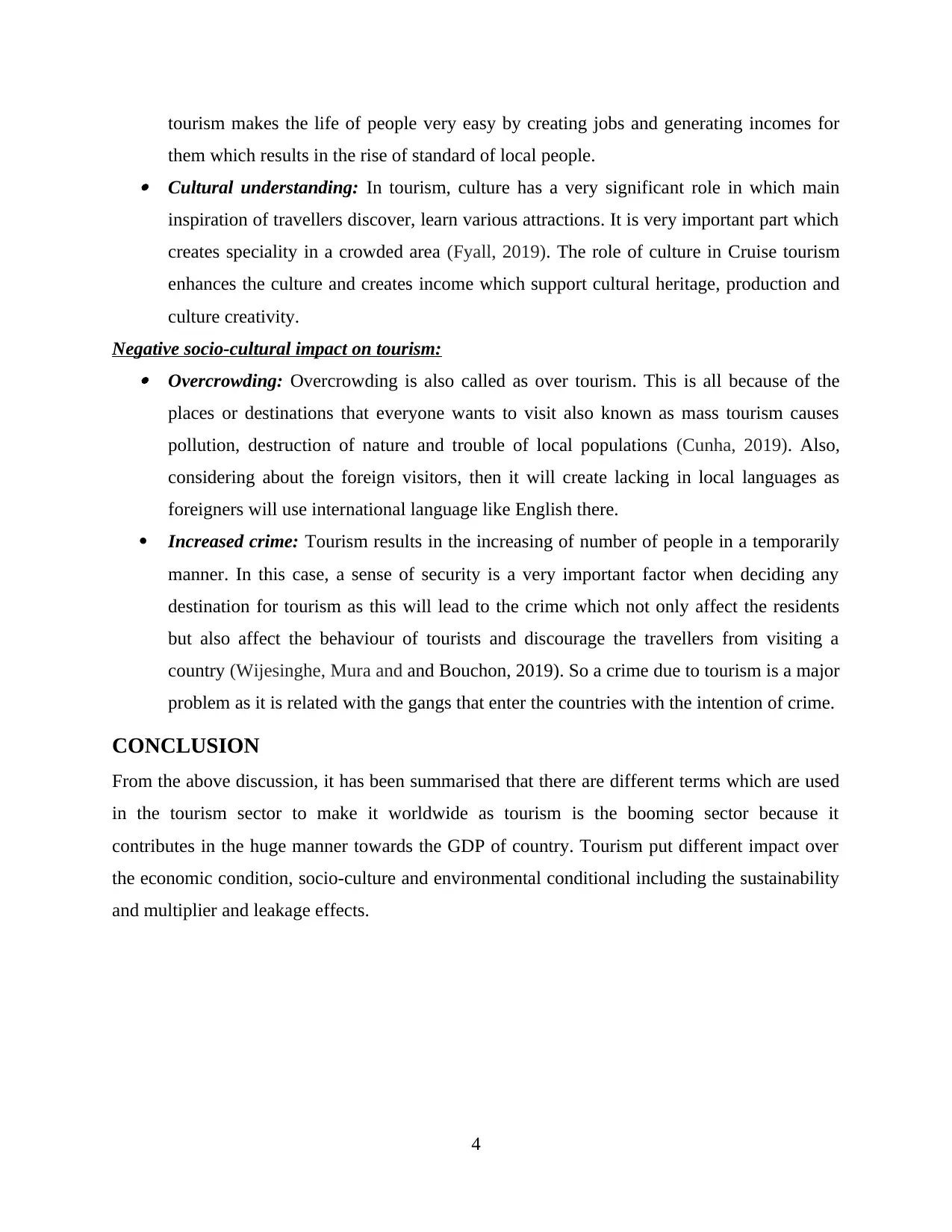
tourism makes the life of people very easy by creating jobs and generating incomes for
them which results in the rise of standard of local people. Cultural understanding: In tourism, culture has a very significant role in which main
inspiration of travellers discover, learn various attractions. It is very important part which
creates speciality in a crowded area (Fyall, 2019). The role of culture in Cruise tourism
enhances the culture and creates income which support cultural heritage, production and
culture creativity.
Negative socio-cultural impact on tourism: Overcrowding: Overcrowding is also called as over tourism. This is all because of the
places or destinations that everyone wants to visit also known as mass tourism causes
pollution, destruction of nature and trouble of local populations (Cunha, 2019). Also,
considering about the foreign visitors, then it will create lacking in local languages as
foreigners will use international language like English there.
Increased crime: Tourism results in the increasing of number of people in a temporarily
manner. In this case, a sense of security is a very important factor when deciding any
destination for tourism as this will lead to the crime which not only affect the residents
but also affect the behaviour of tourists and discourage the travellers from visiting a
country (Wijesinghe, Mura and and Bouchon, 2019). So a crime due to tourism is a major
problem as it is related with the gangs that enter the countries with the intention of crime.
CONCLUSION
From the above discussion, it has been summarised that there are different terms which are used
in the tourism sector to make it worldwide as tourism is the booming sector because it
contributes in the huge manner towards the GDP of country. Tourism put different impact over
the economic condition, socio-culture and environmental conditional including the sustainability
and multiplier and leakage effects.
4
them which results in the rise of standard of local people. Cultural understanding: In tourism, culture has a very significant role in which main
inspiration of travellers discover, learn various attractions. It is very important part which
creates speciality in a crowded area (Fyall, 2019). The role of culture in Cruise tourism
enhances the culture and creates income which support cultural heritage, production and
culture creativity.
Negative socio-cultural impact on tourism: Overcrowding: Overcrowding is also called as over tourism. This is all because of the
places or destinations that everyone wants to visit also known as mass tourism causes
pollution, destruction of nature and trouble of local populations (Cunha, 2019). Also,
considering about the foreign visitors, then it will create lacking in local languages as
foreigners will use international language like English there.
Increased crime: Tourism results in the increasing of number of people in a temporarily
manner. In this case, a sense of security is a very important factor when deciding any
destination for tourism as this will lead to the crime which not only affect the residents
but also affect the behaviour of tourists and discourage the travellers from visiting a
country (Wijesinghe, Mura and and Bouchon, 2019). So a crime due to tourism is a major
problem as it is related with the gangs that enter the countries with the intention of crime.
CONCLUSION
From the above discussion, it has been summarised that there are different terms which are used
in the tourism sector to make it worldwide as tourism is the booming sector because it
contributes in the huge manner towards the GDP of country. Tourism put different impact over
the economic condition, socio-culture and environmental conditional including the sustainability
and multiplier and leakage effects.
4
⊘ This is a preview!⊘
Do you want full access?
Subscribe today to unlock all pages.

Trusted by 1+ million students worldwide
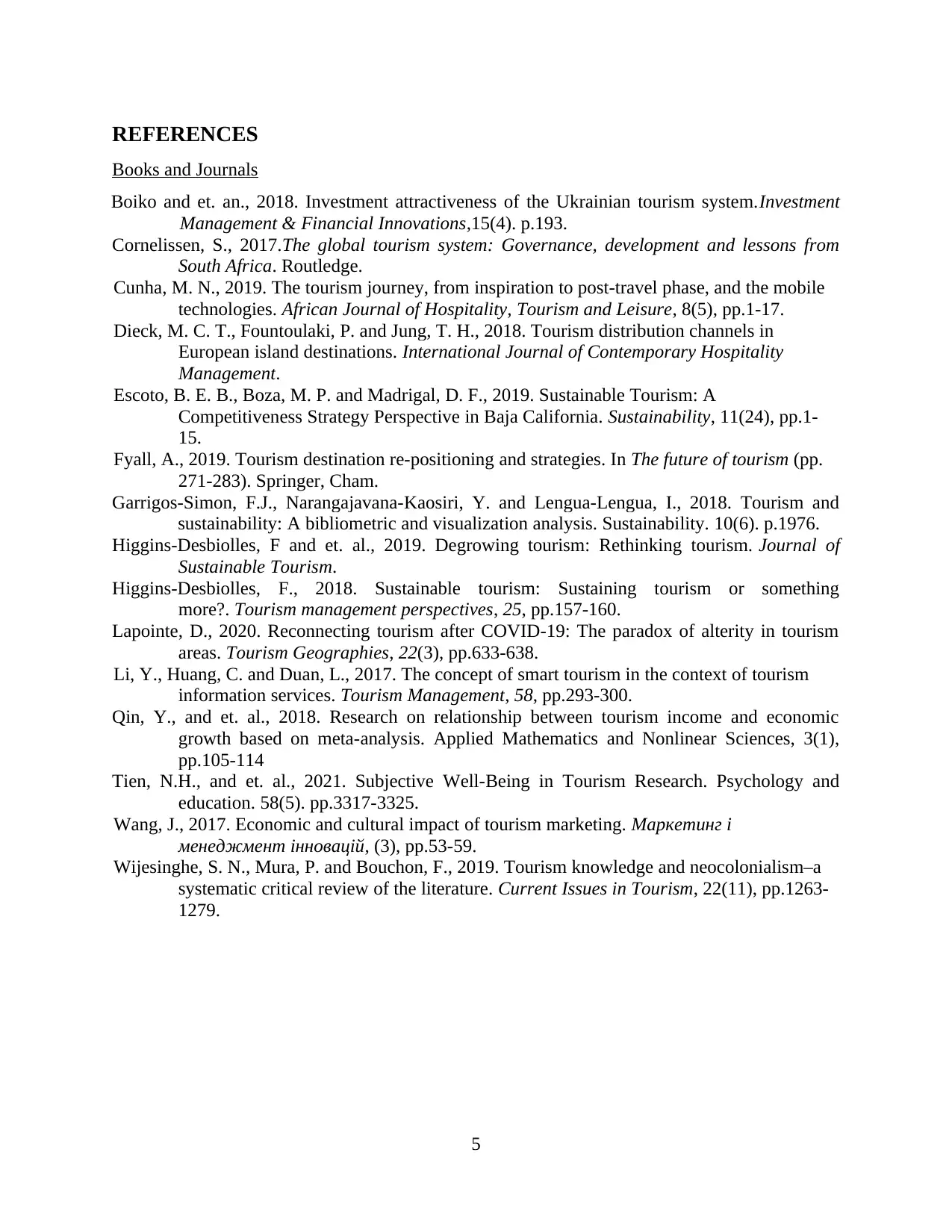
REFERENCES
Books and Journals
Boiko and et. an., 2018. Investment attractiveness of the Ukrainian tourism system.Investment
Management & Financial Innovations,15(4). p.193.
Cornelissen, S., 2017.The global tourism system: Governance, development and lessons from
South Africa. Routledge.
Cunha, M. N., 2019. The tourism journey, from inspiration to post-travel phase, and the mobile
technologies. African Journal of Hospitality, Tourism and Leisure, 8(5), pp.1-17.
Dieck, M. C. T., Fountoulaki, P. and Jung, T. H., 2018. Tourism distribution channels in
European island destinations. International Journal of Contemporary Hospitality
Management.
Escoto, B. E. B., Boza, M. P. and Madrigal, D. F., 2019. Sustainable Tourism: A
Competitiveness Strategy Perspective in Baja California. Sustainability, 11(24), pp.1-
15.
Fyall, A., 2019. Tourism destination re-positioning and strategies. In The future of tourism (pp.
271-283). Springer, Cham.
Garrigos-Simon, F.J., Narangajavana-Kaosiri, Y. and Lengua-Lengua, I., 2018. Tourism and
sustainability: A bibliometric and visualization analysis. Sustainability. 10(6). p.1976.
Higgins-Desbiolles, F and et. al., 2019. Degrowing tourism: Rethinking tourism. Journal of
Sustainable Tourism.
Higgins-Desbiolles, F., 2018. Sustainable tourism: Sustaining tourism or something
more?. Tourism management perspectives, 25, pp.157-160.
Lapointe, D., 2020. Reconnecting tourism after COVID-19: The paradox of alterity in tourism
areas. Tourism Geographies, 22(3), pp.633-638.
Li, Y., Huang, C. and Duan, L., 2017. The concept of smart tourism in the context of tourism
information services. Tourism Management, 58, pp.293-300.
Qin, Y., and et. al., 2018. Research on relationship between tourism income and economic
growth based on meta-analysis. Applied Mathematics and Nonlinear Sciences, 3(1),
pp.105-114
Tien, N.H., and et. al., 2021. Subjective Well-Being in Tourism Research. Psychology and
education. 58(5). pp.3317-3325.
Wang, J., 2017. Economic and cultural impact of tourism marketing. Маркетинг і
менеджмент інновацій, (3), pp.53-59.
Wijesinghe, S. N., Mura, P. and Bouchon, F., 2019. Tourism knowledge and neocolonialism–a
systematic critical review of the literature. Current Issues in Tourism, 22(11), pp.1263-
1279.
5
Books and Journals
Boiko and et. an., 2018. Investment attractiveness of the Ukrainian tourism system.Investment
Management & Financial Innovations,15(4). p.193.
Cornelissen, S., 2017.The global tourism system: Governance, development and lessons from
South Africa. Routledge.
Cunha, M. N., 2019. The tourism journey, from inspiration to post-travel phase, and the mobile
technologies. African Journal of Hospitality, Tourism and Leisure, 8(5), pp.1-17.
Dieck, M. C. T., Fountoulaki, P. and Jung, T. H., 2018. Tourism distribution channels in
European island destinations. International Journal of Contemporary Hospitality
Management.
Escoto, B. E. B., Boza, M. P. and Madrigal, D. F., 2019. Sustainable Tourism: A
Competitiveness Strategy Perspective in Baja California. Sustainability, 11(24), pp.1-
15.
Fyall, A., 2019. Tourism destination re-positioning and strategies. In The future of tourism (pp.
271-283). Springer, Cham.
Garrigos-Simon, F.J., Narangajavana-Kaosiri, Y. and Lengua-Lengua, I., 2018. Tourism and
sustainability: A bibliometric and visualization analysis. Sustainability. 10(6). p.1976.
Higgins-Desbiolles, F and et. al., 2019. Degrowing tourism: Rethinking tourism. Journal of
Sustainable Tourism.
Higgins-Desbiolles, F., 2018. Sustainable tourism: Sustaining tourism or something
more?. Tourism management perspectives, 25, pp.157-160.
Lapointe, D., 2020. Reconnecting tourism after COVID-19: The paradox of alterity in tourism
areas. Tourism Geographies, 22(3), pp.633-638.
Li, Y., Huang, C. and Duan, L., 2017. The concept of smart tourism in the context of tourism
information services. Tourism Management, 58, pp.293-300.
Qin, Y., and et. al., 2018. Research on relationship between tourism income and economic
growth based on meta-analysis. Applied Mathematics and Nonlinear Sciences, 3(1),
pp.105-114
Tien, N.H., and et. al., 2021. Subjective Well-Being in Tourism Research. Psychology and
education. 58(5). pp.3317-3325.
Wang, J., 2017. Economic and cultural impact of tourism marketing. Маркетинг і
менеджмент інновацій, (3), pp.53-59.
Wijesinghe, S. N., Mura, P. and Bouchon, F., 2019. Tourism knowledge and neocolonialism–a
systematic critical review of the literature. Current Issues in Tourism, 22(11), pp.1263-
1279.
5
1 out of 7
Related Documents
Your All-in-One AI-Powered Toolkit for Academic Success.
+13062052269
info@desklib.com
Available 24*7 on WhatsApp / Email
![[object Object]](/_next/static/media/star-bottom.7253800d.svg)
Unlock your academic potential
Copyright © 2020–2026 A2Z Services. All Rights Reserved. Developed and managed by ZUCOL.